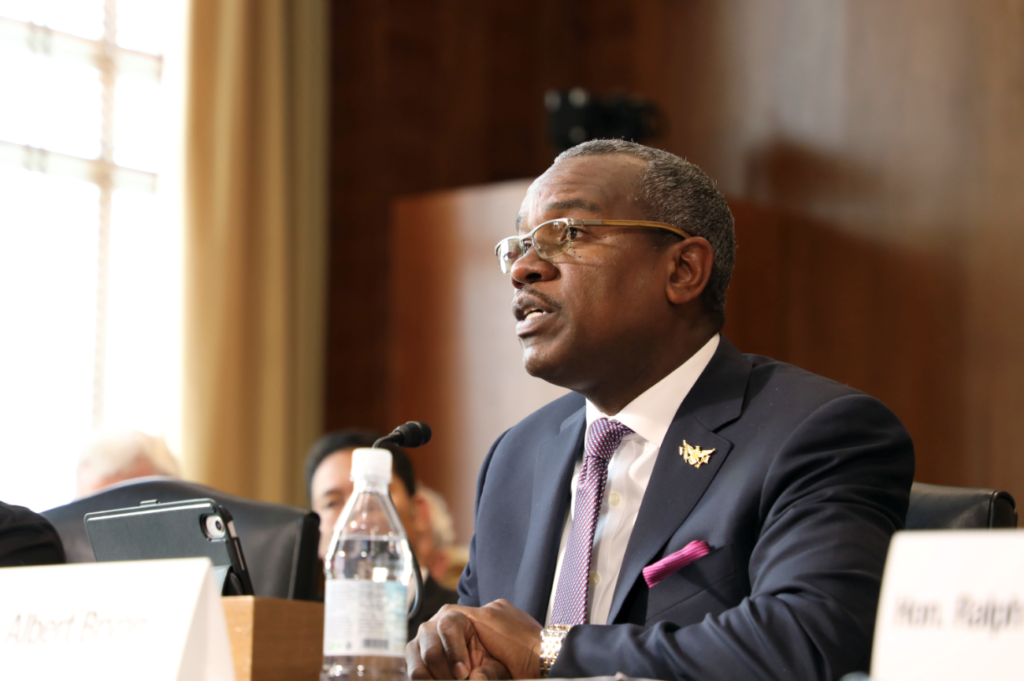CHARLOTTE AMALIE — Administration officials from the Department of Human Services will testify before the House Committee on Energy and Commerce on the Medicaid “Fiscal Cliff” in Washington D.C today, where they will continue the administration’s push for congressional action to prevent the U.S. Virgin Islands and other insular territories from falling off the Medicaid fiscal cliff.
Currently, the U.S. Virgin Islands receives temporary Medicaid funds from the Affordable Care Act and the Bipartisan Budget Act of 2018 (BBA). Each program provides critical health care support to more than 28,000 residents enrolled in Medicaid in the U.S. Virgin Islands, but are set to expire at the end of September 2019 if Congress does not act before that date.
If Congress does not act to avert the fiscal cliff, the territory faces a 40 percent decrease in federal healthcare funds amounting to a $31 million shortfall and the potential loss of Medicaid coverage for 18,000 Virgin Islands residents.
Governor Bryan said Wednesday the administration has been working aggressively to lobby for federal action to avert the crisis and for a permanent resolution to the longstanding disparity in federal healthcare funding to the territory.
Referring to the temporary 100 percent Federal Medicaid Assistance Percentage (FMAP) granted to the territory as part of the BBA after the 2017 hurricanes, Governor Bryan said, “the initial response from the federal government has provided needed help to our healthcare system, but it has been 2 years since the storms, and many are still awaiting the refurbishment of the hospitals so that they can return home and receive medical treatment in the territory.”
The governor noted Wednesday that the majority of the territory’s population is over 50 years of age and more vulnerable to chronic illnesses and infectious diseases and added that, “resolving the longstanding disparities in federal Medicaid funding to the territory is a moral imperative.
“If people don’t have access to affordable healthcare, they get sicker,” the governor said, or even worse they die. The U.S. Virgin Islands must be given parity with the rest of the United States on this issue.”
Governor Bryan and his administration officials have testified before Congress and White House officials four times in recent months and are working with Virgin Islands Delegate to Congress Stacey Plaskett and other members of Congress to lobby for reforms to Medicaid that will keep in place hundreds of millions in funding and protect health coverage for thousands of Virgin Islands residents.
Unlike in the states, where FMAP is not capped, and the federal share varies based on the per capita income or residents of that state, federal funding for Medicaid in the territories is subject to a statutory cap and a fixed federal matching rate. As a result, the FMAP to the U.S. Virgin Islands is capped at 55 percent.
In a recent letter to both the Chairman and Ranking Member of the U.S. Senate Finance Committee and the House Committee on Energy and Commerce, Governor Bryan expressed the urgent need for Congress to address the critical federal and local funding crisis confronting the territory’s healthcare system.
Governor Bryan, in his letter, requested that Congress extend the 100 percent FMAP set to expire at the end of September for two additional fiscal years to afford the territory short term relief.
“For us, this issue is straightforward,” Bryan said. “We need a short-term reprieve that recognizes the recovery is ongoing, but aside from the recovery, it is now time for the Federal government to end the disparity in Medicaid funding to the USVI and other insular territories.”
Bryan has also proposed in his letter that Congress consider supporting an 83 percent FMAP to the U.S.Virgin Islands for three additional fiscal years through September 30, 2024.

